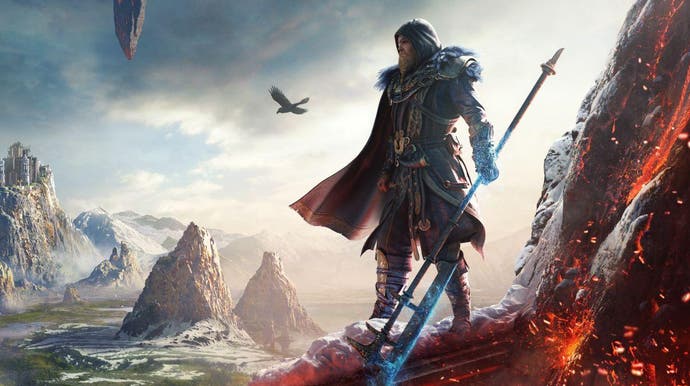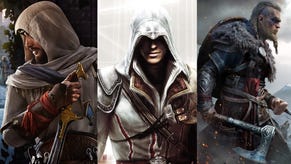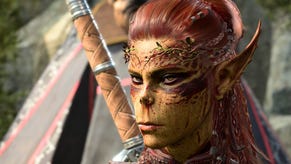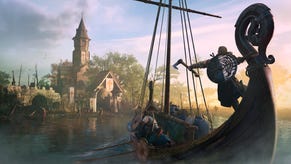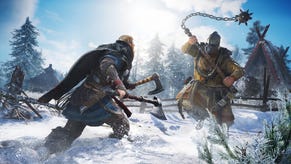Assassin's Creed Valhalla: Dawn of Ragnarök review - a sizeable, satisfying expansion
Lavaish with praise.
Bubbling lava oozes over the once-green surface of Svartalfheim, snaking past its proud, towering Tolkien-esque statues and mountains of gold. Molten fragments now fill its sky, and bear down ominously from above. This dwarven realm has been torn apart by fiery invaders while Odin, supposed protector of the Nine Realms, did not care to intervene. Now, finally, the Norse god has arrived to tackle the marauding Muspels - but only in pursuit of those who have captured Baldr, a beloved son.
It's been some time since I last wandered Valhalla's dreamworlds, the game's mythology-inspired areas that weave a companion tale to its main Norse narrative. (I will try my best to avoid spoilers here.) For most players, Asgard and Jotunheim were a fun diversion from Saxon slaughter, a chance to sightsee some of the bigger names and places in Viking/Marvel Cinematic Universe mythology. For Assassin's Creed diehards, they were also a window into the franchise's longer-running story threads. Here, Dawn of Ragnarök serves up a more expansive mythological storyline that's still grounded and approachable enough for all players, even as the expansion immerses itself fully into fantasy, and layers on a fresh set of systems.
Svartalfheim is a land where, playing as Odin, you finally feel like a god. Through a new power system and fresh abilities, with supercharged gear and across dramatic scenery, Dawn of Ragnarök emerges as a mighty expansion which builds upon the current Valhalla gear endgame with a further array of fireworks, while centring its version of Odin and letting players delve a little deeper into the mind of its mysterious star. Its story, set after the main game's mythical sections but before the much-prophesied Ragnarök itself, fills in more details of Odin's life and motivations. Several faces - some expected, some not - pop back in to accompany you along the way. And there's also a bit more from Eivor herself, in a handful of scenes which neatly cap off the main game.
Dawn of Ragnarök is primarily designed as an endgame expansion, one for those who have mastered Valhalla's basic systems and wrapped up its main plotline. Still, the game's Asgard and Jotunheim story arcs are briefly recapped, and there's even an option to jump straight into the action (and instantly level up if necessary) should you really prefer. Otherwise, Dawn of Ragnarök is largely its own adventure, with the hunt for the previously-unseen Baldr as its macguffin. It's a shame Odin's son was not given screentime in the main game, and the bond between the two was not previously established. There's little time for this here, either, as Baldr begins the adventure already kidnapped, and the relationship between father and son is only touched on in expository dialogue and slightly clunky text screens.
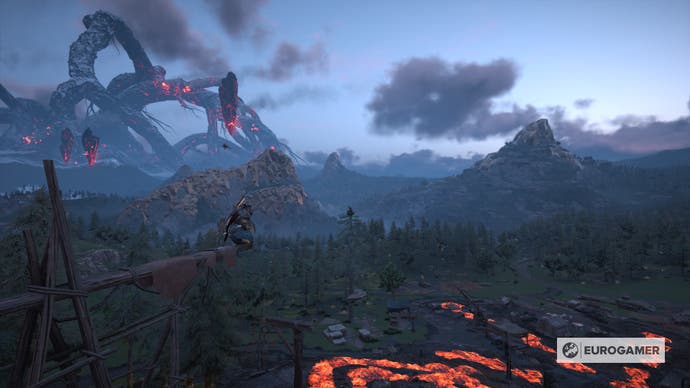
Instead, Odin spends time with the dwarves - lots and lots of dwarves - and the expansion does a good job of showing the god's true colours through interactions with them. There are some nicely drawn characters here (plus another riff on Valhalla's Welsh accent joke, and an invasion-denying dwarf conspiracy theorist), with plenty of tales to uncover simply by chatting with its various vendors and NPCs. The writing throughout the expansion is often lyrical in its archaic turns of phrase, while the bulk of the voice work is performed beautifully by Odin/Male Eivor actor Magnus Bruun, whose warm, husky voice makes you lean in to listen, as if cosying up to a softly crackling log fire.
Dawn of Ragnarök is at its most interesting when we get glimpses of Odin speaking as their truest self. They are kind enough to the dwarven people - now largely refugees living in underground shelters - but not overly remorseful for allowing the dwarven lands to fall, and sometimes downright manipulative. Odin's journey to Svartalfheim is entirely motivated by a search for Baldr and an obsession with averting Ragnarök, and the decision to rid the realm of its invaders is often painted as a neat coincidence of ambitions aligning. There's some nice moments here too with the family of Odin's nemesis, Musphel king Surtur, who are all given times to shine.
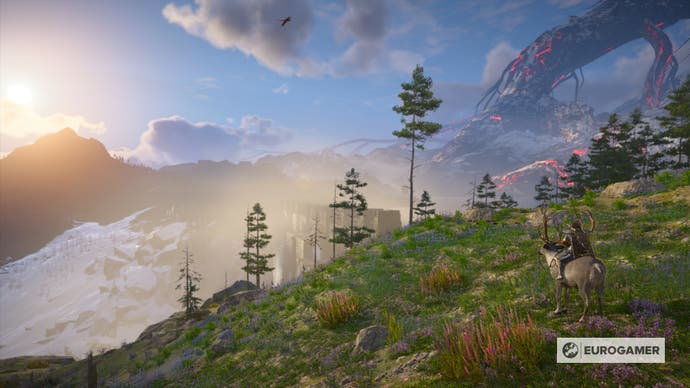
Back in Viking Britain, meanwhile, the expansion is framed by moments with Eivor, who is once again experiencing the memories of Odin through potion-induced dreams. There's a bit more here than I was expecting (after the expansion's introduction sequence, you're free to come and go from Svartalfheim as you please) and I loved the short but engrossing campfire stories which lie in wait for Eivor upon her return, as she tries to process the visions she has seen. (Are these the final interactions we'll get with Eivor and her clan, before whatever's next for the franchise? It seems possible, and there's a sense of conclusion here, including a fan-pleasing return of some old faces, as you return to Ravensthorpe once more.)
These brief moments with Eivor also underscore how powerful Odin feels in comparison, tearing around Svartalfheim, boosted by a fresh set of skills that unleash godlike abilities. Using the new Hugr-rip gadget, Odin can access powers of fire (immunity to lava), ice (shatter enemies), rebirth (resurrecting fallen enemies to act on your side), teleportation (by firing arrows at specific points), and flight (letting you traverse as a raven and land on top of foes, instantly assassinating them).
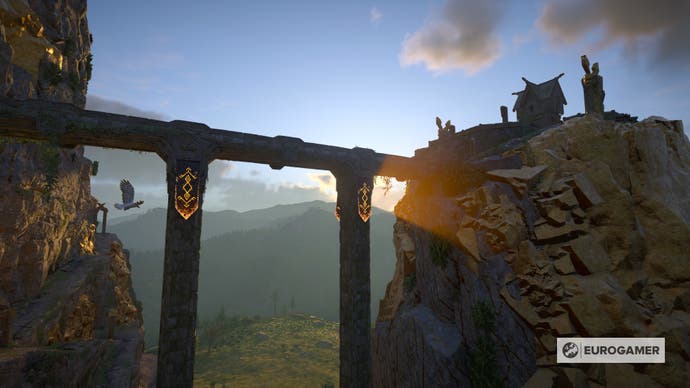
This new suite of skills is kept in check by a fresh power gauge, your Hugr meter, which is refilled through combat, hunting, or via blooming flowers you can explore and find. (Hugr is essentially described as a life force, which can be harvested.) Only two skills can be kept locked in your gadget at a time, with others reacquired from certain enemies (fire from Muspels, flight from giant ravens, etc.) Each skill can also be upgraded to more powerful versions, while the Hugr-rip itself can be customised to fit different playstyles. One option allows you to pick from three active skills instead of the usual two, while another - my favourite - lets you extend the meter's duration by combining skills with precise timing.
Management of your new Hugr meter, as well as balancing which skills you may need at a particular point, adds a new dimension to your time in Svartalfheim. You'll use your powers most often in combat, which often takes place over lava-filled environments that require your fire skill active, with enemy kills chained to ensure your meter remains filled and you don't die a fiery death. Alternatively, these same skills can be used to avoid combat, allowing you to stealthily sneak past troops while disguised as a Muspel or Jotun.
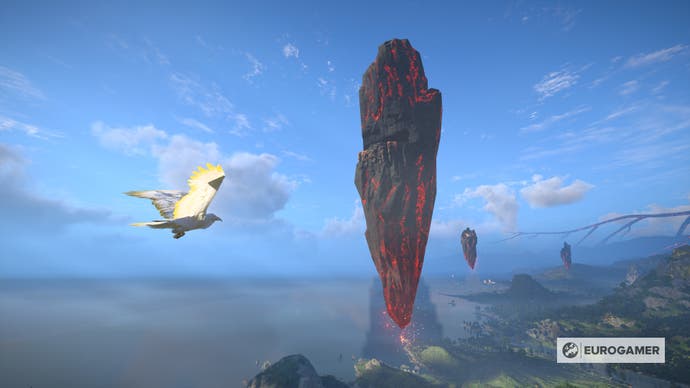
The same abilities are frequently used for exploration and puzzle-solving - such as to warp through gaps in a cave system for hidden treasure, or carry an errant dwarf across a field of lava. Perhaps the most striking use of the raven power is to access the fiery monoliths which hang in the Svartalfheim sky. These are simple locations, yet hold a particularly useful upgrade material, and present a fun challenge to fight on top of. I couldn't help but laugh as an enemy managed to boot me off, and I fell for a full 20 seconds until finally hitting the ground below. Thankfully, the game's new Divine gear quality finally adds the ability (which you can toggle) to remove fall damage - something I've missed since the days of Odyssey.
Outside of the main campaign, which took me around 15 hours, there's activities that'll last more than that again to go find for yourself. Dwarves need rescuing, alpha enemies need defeating and world events need uncovering - sometimes leading to unexpected, elaborate sequences. One simple fetch quest I began ended up with Odin in jail, in a neat homage to the typical video game "strip the hero of their gear" sequence. Another puzzle involving beams of light has a wonderful Easter egg involving cats. Poking into another area, I found a bizarre set of armour which needed purifying, sending me on another adventure. And yes, hidden away, Assassin's Creed fans will find a sliver or two of new Isu lore.
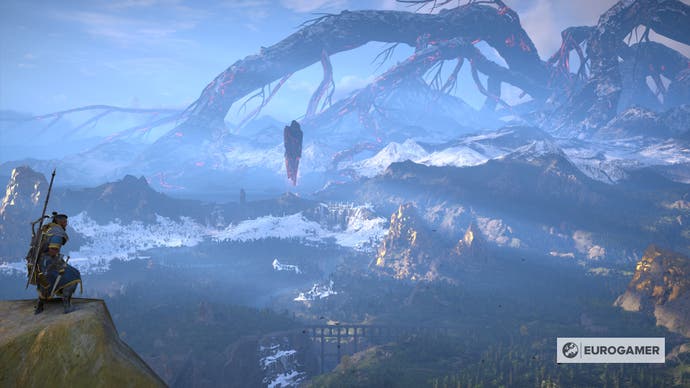
It's not all perfect. Raiding is back, though inexplicably with Eivor's same Viking crew, which makes little sense and only serves to slow down proceedings when your godly powers have to pause for NPCs to come help you open a door. The expansion's big combat arena to unlock fancypants gear tries to keep things fresh by introducing some interesting modifiers, though it still requires hours of grinding to claim it all. Finally, and most importantly, the expansion's story ends a little abruptly - a slightly disappointing note to leave the game on, ensuring the world is left in state where you can, of course, still potter about afterwards. I went and watched the main game's mythological ending sequence again after all that and felt a bit more satisfied.
But for the most part, Dawn of Ragnarök is an expansion to luxuriate in, full of stories big and small, told by fire giants and brave dwarves, and delivered in engrossing fashion. Valhalla's saga stretches long, the game's feast of content grows enormous, but this is its meatiest and most challenging addition since launch - and a satisfying course to devour.
